When considering the safety features of bulletproof cars, one of the most critical components is the bulletproof windows. These specialized windows are designed to provide the utmost protection in dangerous situations, shielding occupants from external threats such as gunfire and explosions. Whether it’s for personal safety or professional reasons, knowing the cost of bulletproof windows is vital for making informed decisions in armored transportation.
Key Takeaways
- Bulletproof windows are built to protect the car without changing how it looks. They use layers of strong materials like glass and plastic to stop bullets.
- The price of bulletproof windows depends on the materials, their thickness, and how much protection is needed. Different materials have different costs.
- It’s usually legal to have bulletproof windows in the U.S., but check local laws to be sure there are no specific restrictions.
- If bulletproof windows are too costly, other options like security films or stronger window frames can increase safety at a lower price.
- Installing bulletproof windows should be done by professionals to ensure they work properly and keep the car safe and running well.
This article explores how bulletproof windows are made, how well they work, and most importantly, how much they cost. Understanding the price of these windows is key for anyone looking to enhance their vehicle’s security.
What Are Bulletproof Windows?
Bulletproof windows are designed to offer strong protection while keeping the car’s appearance intact. These windows comprise several layers, including laminated glass and tough polycarbonate.
Each layer is important for absorbing and spreading the energy from projectiles like bullets. The technology used in these windows slows down bullets as they pass through each layer. While the outer glass layers might crack, the inner polycarbonate layer stops the bullet from going through, ensuring the safety of those inside the vehicle.
What Materials Are Used in Bulletproof Windows?
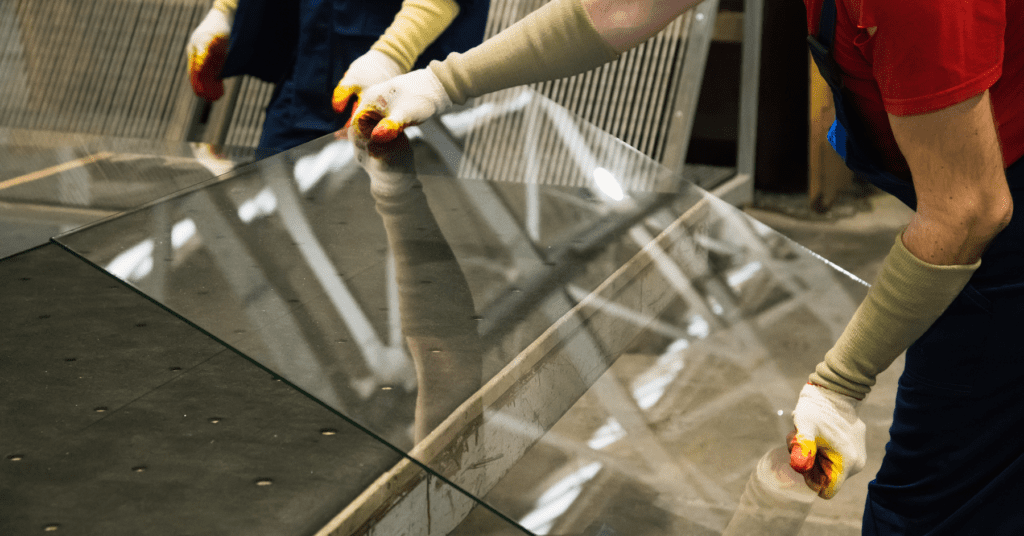
Bulletproof windows are typically made from a combination of materials that work together to protect against gunfire and other projectiles. The most common materials used include:
Laminated Glass
This is one of the most common materials used in bulletproof windows. It consists of multiple layers of glass bonded with interlayers of polyvinyl butyral (PVB) or ethylene-vinyl acetate (EVA). The interlayers help prevent the glass from shattering and provide resistance against bullets. Laminated glass is known for its optical clarity and can include additional features like sound insulation and UV protection.
Polycarbonate
This type of plastic is highly effective at absorbing and dispersing impact energy, making it another common choice for bulletproof windows. Polycarbonate is lighter than glass and can be used alone or combined to enhance bullet resistance while maintaining transparency.
Acrylic (Plexiglass)
Acrylic is used for its lightweight and strong impact resistance. It is often used where transparency is essential, such as in banks or retail environments. Although it provides good bullet resistance, acrylic can be susceptible to scratching and may degrade over time without proper UV protection.
Glass-Clad Polycarbonate
This material combines layers of glass and polycarbonate, offering the hardness and scratch resistance of glass with the impact-absorbing properties of polycarbonate. It’s typically used in high-security applications where durability and bullet resistance are critical.
Tempered Steel
Some bulletproof glass incorporates layers of tempered steel to enhance its protective capabilities. This material is used because of its strength and ability to stop projectiles effectively.

Why Are Bulletproof Windows Important for Personal Security?
In a world where safety is uncertain, bulletproof windows are essential for defense against external threats. Not only do they protect against gunfire, but they also provide crucial time for individuals to react and escape during an attack, potentially saving lives. Additionally, these windows enhance vehicle security by making it difficult for attackers to gain physical access, which is especially important in urgent situations.
Who Uses Bulletproof Windows in Their Cars?
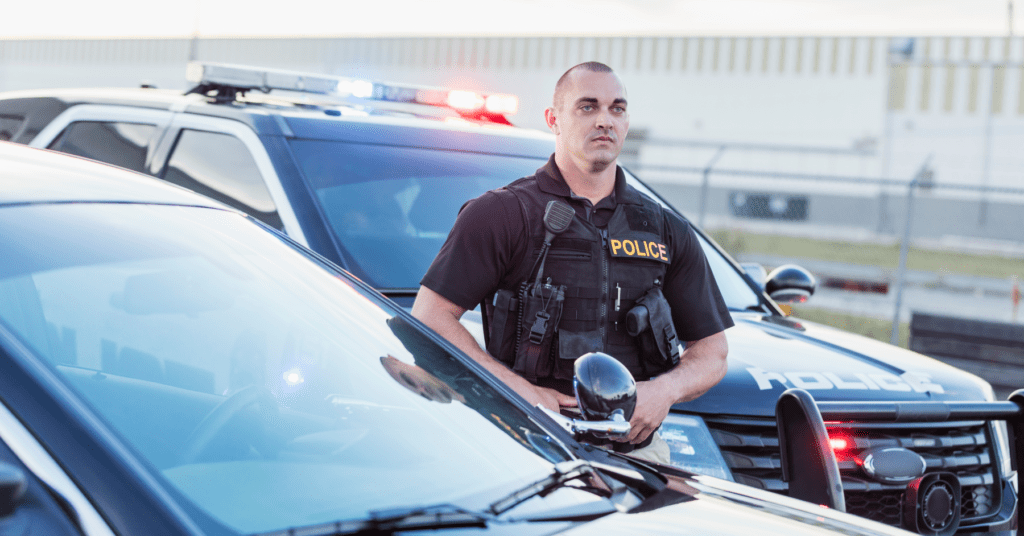
Bulletproof windows are typically used by individuals who face elevated risks in their daily lives. Here’s a look at the specific groups that commonly utilize this technology:
- Government Officials: High-ranking government officials often require enhanced security measures due to their visibility and the nature of their roles.
- Celebrities: Famous personalities, including actors, musicians, and public figures, use bulletproof windows to protect against potential threats from overzealous fans or other dangers.
- Business Executives: Executives of major corporations, especially those who work in industries like finance or international trade, may be targets for kidnapping or attacks.
- Private Individuals in High-Crime Areas: Residents of areas with high rates of violent crime or civil unrest find bulletproof windows a prudent addition to their vehicles.
- Security Personnel: Bodyguards and private a security teams often drive vehicles equipped with bulletproof windows.
- Law Enforcement and Military Use: Police and military units in many countries use bulletproof and armored vehicles to handle high-risk operations, including SWAT team deployments, border patrol, and anti-terrorism activities.
Related article: How To Win A Gun Fight: Military Gun Fight Tactics
Factors Influencing the Cost of Bulletproof Windows
Understanding the factors contributing to bulletproof windows’ cost is key to evaluating whether they’re the right investment for your safety needs.
Level of Protection
The level of ballistic protection required is one of the primary factors. Higher levels of protection, which involve thicker and more advanced materials, are more expensive. The specific ballistic ratings, such as those provided by the National Institute of Justice (NIJ) or Underwriters Laboratories (UL), determine how resistant the glass is to various types of ammunition, impacting the price significantly.
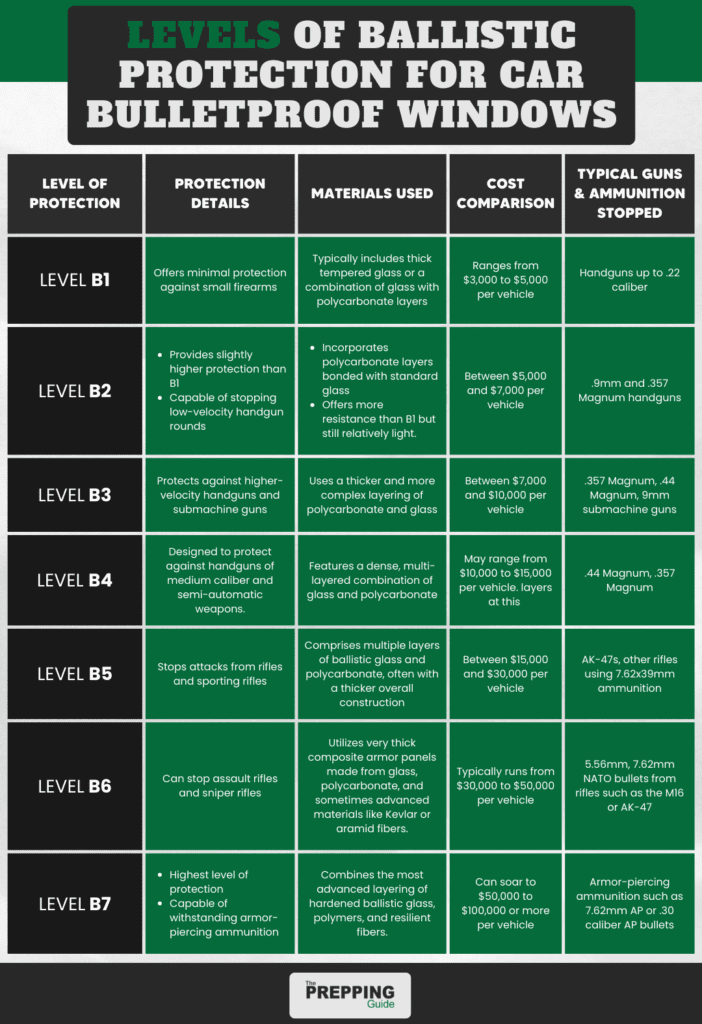
Materials Used
Laminated glass is generally less expensive than polycarbonate, which offers higher impact resistance and is typically more costly. Glass-clad polycarbonate combines the benefits of both glass and polycarbonate, providing superior protection but at a higher price.
Size and Thickness
Larger and thicker windows cost more due to the increased amount of material used. The thickness is often related to the level of ballistic protection desired, with higher levels requiring thicker glass.
Customization and Installation
Custom shapes, sizes, or features like tinting and special coatings can add to the cost. Additionally, the complexity of the installation process, which may require specialized labor and equipment, particularly for large or uniquely shaped windows, significantly affects the total cost.
Frame Material
The type of frame material can also influence the cost. Frames made from stronger materials like steel are generally more expensive than those made from aluminum or other materials.
Certification and Compliance
Ensuring the bulletproof glass meets certain safety and quality standards can add to the cost. Certified products have been tested to meet specific standards, involving additional manufacturing and testing expenses.
Additional Features
Bulletproof windows with UV protection, soundproofing, or blast resistance generally cost more. These features often require additional materials or specialized construction techniques.
Average Costs of Bulletproof Windows for Different Car Models
The cost of installing bulletproof windows in vehicles varies significantly based on the type of car, the level of ballistic protection desired, and the specific features of the bulletproof glass.
Here’s a general overview of how these factors influence pricing across different types of vehicles:
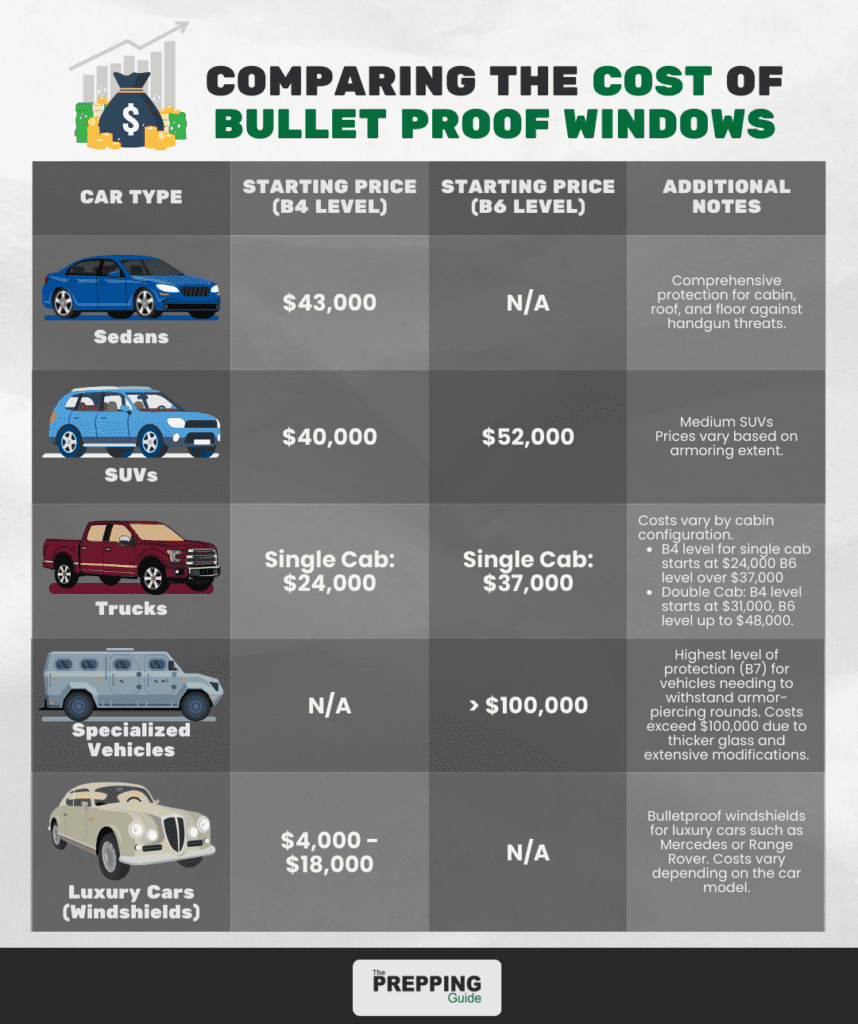
These prices are indicative, and actual costs can vary based on specific vehicle models, local market conditions, and the selected bulletproofing company. Each project may require a customized approach, including additional security features beyond just the windows, such as bullet-resistant panels and reinforced door structures.
It’s recommended to consult with a professional armoring service to get a detailed quote based on your specific requirements and vehicle type.
What to Consider When Installing Bulletproof Windows
When considering the installation of bulletproof windows in cars, it’s important to focus on factors that ensure optimal protection while maintaining vehicle functionality and aesthetics.
Here are key considerations to keep in mind:
- Level of Protection Needed: Assess the specific threats you aim to protect against, such as small arms fire or heavier ballistic impacts. The level of protection is categorized by standards such as UL 752 or NIJ ratings, which specify the types of bullets the glass can resist.
- Material Selection: Choose between different materials like laminated glass, polycarbonate, and glass-clad polycarbonate, each offering different levels of ballistic resistance, weight, and optical clarity.
- Weight Considerations: The added weight of bulletproof glass can affect a vehicle’s performance and handling. Ensure the vehicle’s structure can support the extra weight or consider necessary modifications to accommodate it.
- Certification and Testing: Opt for products that have been tested and certified by reputable organizations. Common certifications include:
- UL 752: Underwriters Laboratories standard for bullet-resistant materials, providing ratings based on the material’s ability to stop specific ammunition.
- NIJ Standards: The National Institute of Justice provides ratings for ballistic resistance, commonly used for law enforcement and security applications.
- Professional Installation: Proper installation is crucial for maintaining the integrity of bulletproof windows. Use experienced professionals who specialize in automotive bulletproofing to ensure correct fit and maximum protection.
- Cost and Budgeting: Costs can vary widely based on the material, level of protection, and labor involved. Plan your budget to include potential costs for additional modifications required by increased weight, such as suspension upgrades.
- Aesthetics and Visibility: Consider how the installation will affect the vehicle’s appearance and the driver’s ability to see clearly. Some materials may have tinting or thickness that can alter visual perception.
- Regulatory Compliance: Check local regulations concerning vehicle modifications to ensure that your bulletproofing enhancements are legal. Some regions may have specific requirements or restrictions on modifying vehicles for added protection.
Maintenance and Care for Bulletproof Windows
Maintaining and caring for bulletproof glass is crucial to ensure it retains its protective qualities and remains in good condition over time. Here are some guidelines to help you properly maintain bulletproof glass:
- Regular Cleaning: Clean the glass using a soft cloth or sponge and a mild detergent. It’s important to remove dirt and debris accumulating on the glass, as these can obscure visibility and weaken the material over time.
- Avoid Abrasive Cleaners: Use non-abrasive, gentle cleaning solutions. Ammonia-free glass cleaners are recommended because they are less likely to damage the protective layers of the glass. Spray the cleaner onto a microfiber cloth rather than directly onto the glass to prevent the liquid from seeping into the edges and potentially degrading the seals.
- Regular Inspections: Check for any signs of damage, such as cracks, scratches, or delamination (where layers start to separate). Even small imperfections can compromise the integrity of bulletproof glass, so it’s important to address these issues promptly.
- Proper Handling: Avoid slamming doors or applying excessive force to the glass, as this can cause stress and potential damage. Ensure that the window frames and supporting structures are also well-maintained, as these contribute to the overall effectiveness and durability of the bulletproof glass.
- Use Proper Sealants: Ensure that all edges and seals are intact. Sometimes, the sealant or caulking around the glass may wear out or become damaged. Check these areas regularly and reseal them if necessary to maintain the barrier against moisture and debris, which can lead to fogging and other visibility issues.
- Professional Maintenance: For high-security environments, or when any significant issues are noticed, consult a professional for maintenance. Professionals can provide services such as polishing to remove minor abrasions, full inspections, and repairs for any compromised areas of the bulletproof glass.
- UV Protection: If your bulletproof glass is exposed to direct sunlight, consider using UV protectant treatments. Prolonged exposure to UV light can degrade certain types of bulletproof materials, reducing their effectiveness.
Troubleshooting Common Issues with Bulletproof Windows
Maintaining bulletproof windows is crucial for ensuring they function properly and provide the necessary level of protection. Here are some common issues associated with bulletproof windows and tips on how to troubleshoot them:
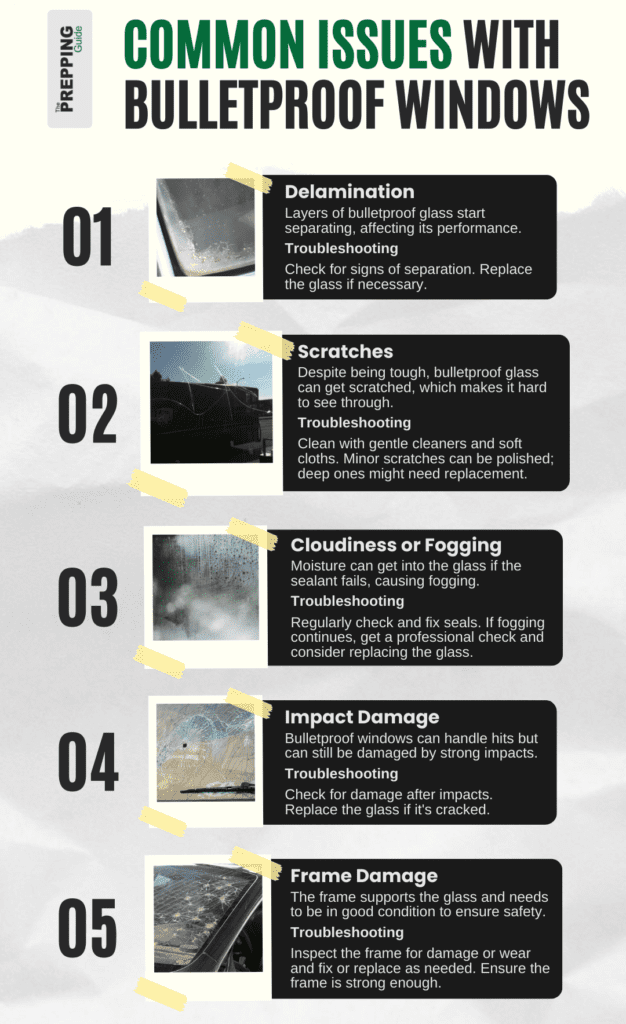
If you encounter persistent problems or are unsure about the condition of your bulletproof windows, consulting with a professional specialising in high-security installations is advisable. They can provide expert advice and services to ensure your windows remain effective and secure.
Legal Considerations and Regulations
In the United States, installing bulletproof windows in your car is generally legal. There are no specific federal laws prohibiting the bulletproofing of vehicles, which means the legality primarily depends on state and local regulations.
However, some states may have their own specific rules regarding vehicle modifications, which could include bulletproofing. Therefore, it’s essential to check the local laws in your state or consult with a legal expert to ensure compliance with any regional regulations before proceeding with such modifications.
For instance, while federal laws don’t specifically address bulletproofing vehicles, modifications must not compromise the safety and operability of the vehicle as per the guidelines set by the National Highway Traffic Safety Administration (NHTSA).
Additionally, any modifications that could potentially affect the vehicle’s emissions might also require approval to ensure compliance with the Environmental Protection Agency (EPA) regulations.
Always ensure that the modifications, including bulletproof windows, do not interfere with the vehicle’s safety features or structural integrity, and consult professionals who specialize in armored vehicle modifications to guarantee that all work is done according to legal and safety standards.
Alternatives to Bulletproof Windows
Not everyone may need the level of security provided by bulletproof windows, or the cost may be prohibitive. In such cases, alternatives like the following can be an effective option:
- Security Window Film: This popular alternative involves applying a thick, clear film over existing windows. It doesn’t make the windows bulletproof but can significantly increase their resistance to shattering. Security films are particularly effective against smash-and-grab burglaries and can also protect against low-level ballistic impacts.
- Polycarbonate Panels: These are less expensive than bulletproof glass and can be installed over existing window structures. Polycarbonate is extremely impact resistant and can withstand forceful impacts, though it is not rated to stop bullets like higher-end ballistic glass. However, it offers a significant upgrade in security compared to standard glass.
- Tempered Glass: While not bulletproof, tempered glass is much stronger than regular glass. It is designed to shatter into small, blunt pieces that are less likely to cause injury, which provides a degree of security against break-ins.
- Laminated Glass: Similar to the technology used in car windshields, laminated glass holds together when shattered. While it won’t stop bullets, it can prevent the glass from breaking apart easily, offering more resistance against forced entry.
- Reinforced Window Frames and Locks: Strengthening the window frames and improving the locks can deter break-ins. Combining this with any of the above glass options enhances window security without going to the full expense of bulletproof solutions.
Comparing Security Features: Bulletproof Windows vs Other Options

When comparing security features of bulletproof windows to other security-enhancing window options, several factors such as cost, level of protection, and visual clarity come into play. Each option offers a trade-off between cost and level of security. Bulletproof windows are ideal for high-risk scenarios where ballistic protection is necessary.
In contrast, options like security films and polycarbonate panels provide sufficient protection for lower-risk situations at a lower cost. The choice depends largely on the specific security needs, budget, and the structure in which the windows are installed.
Conclusion
Enhancing your vehicle with bulletproof windows is a significant decision that involves understanding the costs and the legal and practical implications.
Whether your concern is personal safety or asset protection, bulletproof windows offer a reliable solution that can be tailored to your needs. However, weighing these benefits against other security measures that might be more appropriate or affordable for your situation is important.
FAQs
What are bulletproof windows made of?
Bulletproof windows are typically made from a combination of laminated glass and polycarbonate, a strong plastic. This composition helps absorb and disperse the energy of projectiles, offering high-level protection.
Can bulletproof windows break?
While designed to withstand impacts from bullets, bulletproof windows are not entirely unbreakable. They can resist certain levels of force but may crack or show signs of damage under severe impacts. Regular inspections and maintenance are crucial to ensure their integrity.
How long does bulletproof glass last?
With proper maintenance, bulletproof glass can last many years. However, factors such as environmental exposure and the frequency of impact can affect its longevity. Periodic assessments by specialists can help determine the need for repairs or replacement.

Could a Nissan Rogue, Toyota RAV-4 or a Nissan Murano have bullet proof windows?
Or is V8 engine a requirement?
Lighter SUVs could likely handle a lower B rank windshield since the weight is less, but then you are trading off weight for security. Still better than nothing. Higher rank B7 type windshield/glass would be too much weight for the power and stability.
I’m curious to know how much it would cost to bulletproof a car. I’m thinking about getting a new one and want to make sure it’s safe!